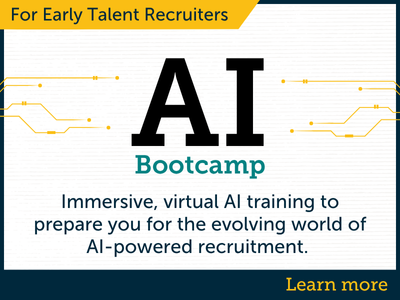Spotlight for Career Services Professionals
Spotlight for Recruiting Professionals
Matthew Cowley warns that any trend that emerges that is considered to be a best practice could potentially threaten equitable outcomes for marginalized students.
“If we are not careful and not paying specific attention to these trends, equitable outcomes for marginalized students are at risk because these trends burst out of an inequitable system,” explains Cowley, associate director, student engagement, University of Florida.
He cites artificial intelligence that is increasingly used in college recruiting as an example.
“We know that artificial intelligence is built by biased humans, so their bias appears in the artificial intelligence,” Cowley says.
“Companies have tried to use facial recognition to determine whether or not a candidate was friendly and had a welcoming demeanor in an interview setting. However, that type of technology is vulnerable to bias against women and people of color if it is not adequately trained using a significant number of women and people of color.”
Likewise, he says, training a system can also be problematic for organizations that have tried to use artificial intelligence software to parse candidate resumes because the resumes they used to train the system are often based on the resumes of successful candidates already within their organization. Women and people of color could be disproportionately affected by this.
“We have to consciously question why we are trying to incorporate this technology,” Cowley recommends.
“In many cases, it is to be more efficient. However, that push for greater efficiency may lead to implementing discriminatory processes.”
Another area of concern is assessments. For example, Cowley explains that many companies and organizations use personality assessments to see if a candidate “fits” within an organization.
“Many of the organizations that have created these assessments have said they should not be used to make hiring decisions,” he points out.
“If you are trying to make decisions based on these categories, you might tend to lean one way or another and, for instance, believe that only an extrovert can be successful in a sales job, when psychology research shows that candidates from any of the different [Myers-Briggs Type Indicator] categories can be successful in these roles. We tend to want to simplify things to say this is the type of person who would succeed in a particular role. In an effort to be more efficient, organizations may strip out parts of the recruiting process that allow people to show who they are and how they could be successful.”
Cowley says the less a company interacts with a candidate, the less the company will know about that candidate.
“I'm not saying that we should never use recorded interviews,” he maintains.
“However, a lot of companies use recorded interviews as a way of saving the human resources of having people actually conduct the interviews, cutting down on the face time that they are spending with their candidates.”
This is a critical miss, Cowley says, because interviewees take cues from personal interactions with recruiters and can anticipate and determine what an organization is looking for better when they are interacting in person.
“Taking away that face time can be harmful, especially for marginalized students,” he explains.
“Marginalized students are having a harder time with their career exploration and job search because they have different needs than other students. For example, a student who is from the LGBTQ community may not be confident that an organization will be welcoming to people from that community. The organization might not have done anything that would suggest otherwise, but we need to remember that it was just recently that the Supreme Court ruled that people could not be discriminated against based on their sexuality.
“People, especially those from marginalized groups, may assume that the world is not set up in a way for them to succeed or for them to be welcomed. When we implement trends that take away face time with candidates, we also remove the ability to create trust throughout the interview and onboarding processes.”
In career centers, career coaches and career counselors can be unaware of some of these trends if they are in an office bifurcated by career coaching and counseling and employer relations.
“There is nothing wrong with that model, but staff need to make sure that there are intentional conversations happening between those two teams so there are opportunities for career counselors and career coaches to speak directly with people who work with industry so they can learn how and understand why companies are using certain tools,” Cowley says.
Furthermore, he adds, conversations with recruiters allow career coaches and career counselors to ask questions and provide feedback from students about new tools and approaches.
“Career coaches and counselors are in a position to understand from both the employer perspective and the student perspective what these different trends and practices are and any issues with them,” Cowley says.
“We all need to work together to make sure that all students are still having the best recruiting experience and that outcomes are equitable.”






